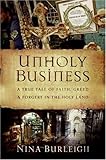 Flap copy from ARC:
Flap copy from ARC:"In 2002, an ancient limestone box called the James Ossuary was trumpeted on the world's front pages as the first material evidence of the existence of Jesus Christ. Today it is exhibit number one in a forgery trial involving millions of dollars worth of high-end, Biblical era relics, some of which literally re-wrote Near Eastern history and which could lead to the incarceration of some very wealthy men and embarrass major international institutions, including the British Museum and Sotheby's.
Set in Israel, with its 30,000 archaeological digs crammed with biblical-era artifacts, and full of colorful characters—scholars, evangelicals, detectives, and millionaire collectors—Unholy Business tells the incredibly story of what the Israeli authorities have called "the fraud of the century." It takes readers into the murky world of Holy Land relic dealing, from the back alleys of Jerusalem's Old City to New York's Fifth Avenue, and reveals biblical archaeology as it is pulled apart by religious believers on one side and scientists on the other."
Though Unholy Business has the potential to be a riveting read, it falls far short with its disjointed approach to storytelling. The author bounces back and forth through time and introduces a dizzying array of similarly named characters in the process. In the beginning, I found myself flipping back to previous chapters just to track the chain of events and people involved. The complicated story of this massive fraud often seemed to take a back seat to the author's opinion of the reasons behind the fraud which made for a much less compelling narrative.
I was disappointed that this book focused so much on personalities rather than on the facts of the case. I also thought the ending was abrupt and unsatisfying. A more scholarly approach to this interesting case would have made for a much more satisfying read.
No comments:
Post a Comment